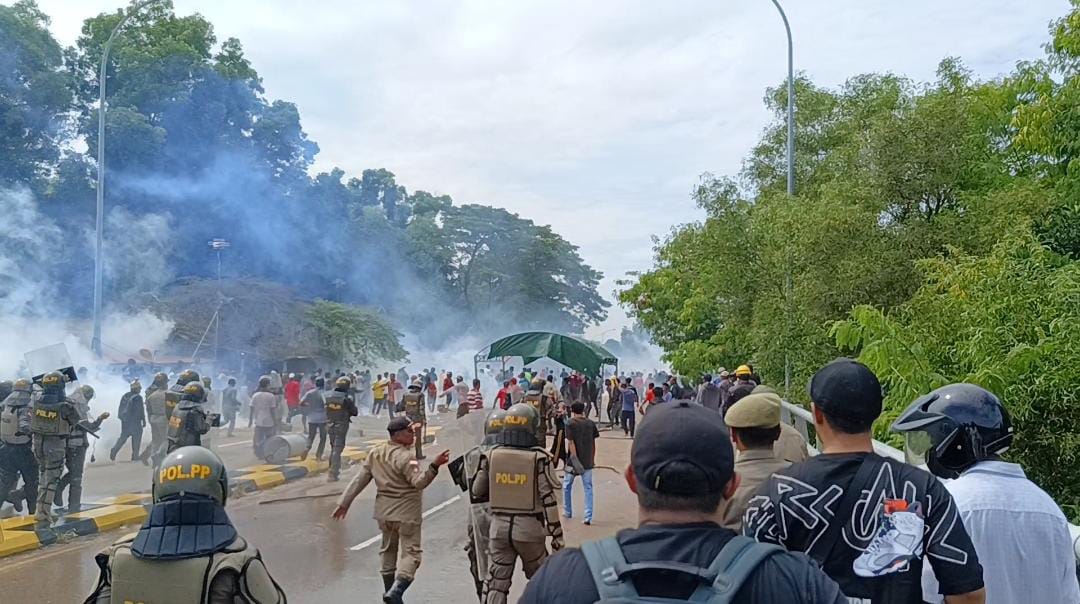Rempang: indigenous people challenge multibillion-dollar Chinese plant
The island is strategically located with access to the Strait of Malacca. Residents of 16 local villages are refusing to relocate to make way for the venture, which would damage the cultural heritage of the indigenous Melayu ethnic group. This is not the first time that people's dissatisfaction has turned into violent acts against Chinese workers employed in the industrial hubs.
Rempang (AsiaNews) - For two days more than 5 thousand indigenous people of the Melayu (Malay) ethnic group have been in open revolt against the Indonesian government to prevent 16 villages on the island of Rempang, in the province of the Riau Islands of Sumatra, from being destroyed to make room for a Chinese industrial project.
"We are desperate because our demands to preserve our villages have been ignored. The uprising has become the only solution to express our demands," said Hazrin, a protester who joined the anti-government protests yesterday. The local police tried to disperse the demonstrators using tear gas.
Jakarta would like to make room for the Xinyi group (Xinyi Glass and Xinyi Solar, based in Hong Kong) for the creation of an industrial glass plant thanks to an investment worth 11.6 billion dollars, which in turn is part of a larger project large named Rempang Eco-City.
With its 165 square kilometers of flat land, Rempang is a very small but commercially strategic island thanks to its access to the Strait of Malacca. The island is 3 km from Batam Island, the distance from Singapore to which is approximately 20-30 minutes by ferry.
When Investment Minister Bahlil Lahadia visited the site in early August, he declared that the plant "will become the world's number one glass and solar energy producer outside of mainland China", whose products will serve the needs of the industries automotive and energy.
The minister added that 35 thousand jobs would be created; but as has already happened in other parts of Indonesia following similar investments, the industry will hire skilled Chinese workers rather than local employees.
The Indonesian population had already vented their anger in similar circumstances attacking Chinese factories, as was the case a few months ago with the nickel smelter in Morowali, in central Sulawesi, where two Indonesians and a Chinese man lost their lives in the clashes.
Lahadia had offered the local inhabitants of Rempang to move into housing complexes ready for them, but the population is wary: "We are not against foreign investments, but please make sure that this project does not damage our traditional Melayu villages.
The province of Riau island is not small, so the project could be established in another area so as not to damage our historical and traditional heritage,” explained Samsudin, another protester.
According to the local population, in fact, the multi-billion Chinese investments will compromise the cultural heritage and traditional lifestyle of the indigenous Malay villages, where thousands of people have lived for decades and are mostly employed in fishing. “We cannot remain silent on this issue as our heritage will disappear when the industrial project is on our lands,” the demonstrators said.
The local authority on the island of Batam, Muhammad Rudi, explained that the issue had been resolved in April, when adequate financial compensation for the inhabitants had been provided. But it wouldn't be the first time residents have not received the funds, protesters said.
The environmental NGO Walhi also claims that the multi-billion dollar project was not so "transparent" from the beginning, as the demands of the local population were never adequately addressed.
"This is why, we as civil society of Riau, ask Indonesian President Joko Widodo to suspend the project as it is potentially harmful to the traditional life of the Melayu", stated the director of the organization.
12/02/2016 15:14








.png)










